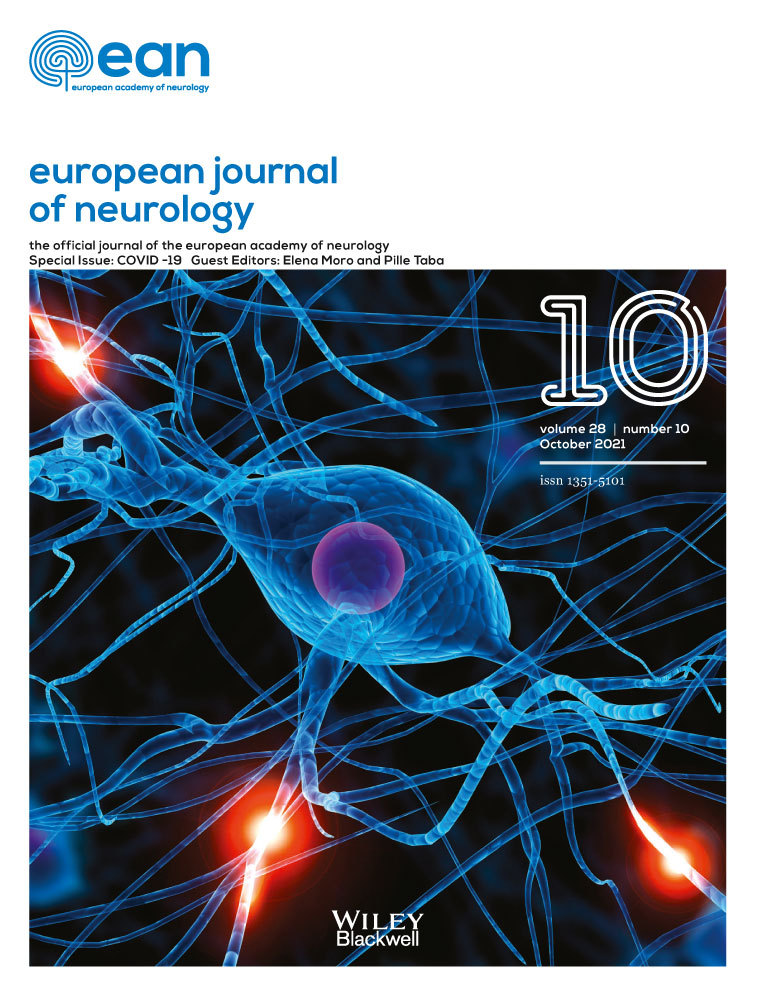COVID-19 in multiple sclerosis patients: susceptibility, severity risk factors and serological response
Abstract
Background and purpose
Information regarding multiple sclerosis (MS) patients with the 2019 novel coronavirus disease (COVID-19) is scarce. The study objective was to describe the incidence and characteristics of MS patients with COVID-19, to identify susceptibility and severity risk factors and to assess the proportion of positive severe acute respiratory syndrome coronavirus 2 (SARS-CoV-2) serologies according to disease-modifying treatments.
Methods
This was a retrospective study of an MS cohort analysing data collected between February and May 2020. Cases were identified through an email survey and clinical visits. The relationship of demographic and MS characteristics with COVID-19 and of the disease-modifying treatments with SARS-CoV-2 serostatus were examined.
Results
Data from 48 suspected cases out of 758 valid respondents and from 45 COVID-19 cases identified through clinical visits were collected. Incidence was 6.3%. Nineteen (20.3%) patients were hospitalized and two (2.2%) died. Multivariable models determined that age (odds ratio [OR] per 10 years 0.53, 95% confidence interval [CI] 0.34–0.85), contact with a confirmed case (OR 197.02, 95% CI 56.36–688.79), residence in Barcelona (OR 2.23, 95% CI 1.03–4.80), MS duration (OR per 5 years 1.41, 95% CI 1.09–1.83) and time on anti-CD20 treatment (OR per 2 years 3.48, 95% CI 1.44–8.45) were independent factors for presenting COVID-19 and age (OR per 10 years 2.71, 95% CI 1.13–6.53) for a severe COVID-19. Out of the 79 (84.9%) with serological test, 45.6% generated antibodies, but only 17.6% of those on anti-CD20 therapies. Lymphopaenia or immunoglobulin levels did not relate to COVID-19.
Conclusions
Multiple sclerosis patients present similar incidence, risk factors and outcomes for COVID-19 as the general population. Patients treated with an anti-CD20 therapy for a longer period of time might be at a higher risk of COVID-19 and less than 20% generate an antibody response. Only age was related to severity.
CONFLICT OF INTEREST
The author(s) declared the following potential conflicts of interest with respect to the research, authorship and/or publication of this article. A.Z. has received travel expenses for scientific meetings from Biogen-Idec and Novartis, speaking honoraria from Eisai and a study grant from Novartis. S.C.-R. is an ECTRIMS clinical fellowship awardee; has received travel expenses for scientific meetings from Biogen-Idec and Genzyme; compensation for consulting services or participation in advisory boards from Roche and Novartis; and speaking honoraria from Novartis. P.T. is an ECTRIMS clinical fellowship awardee; has received travel expenses for scientific meetings from Roche. G.A. has received compensation for consulting services or participation in advisory boards from Sanofi, Merck and Roche; research support from Novartis; travel expenses for scientific meetings from Novartis, Roche, Stendhal and ECTRIMS; speaking honoraria from Sanofi and Merck; and is a member of the International Women in Multiple Sclerosis (iWiMS) network executive committee. S.O.-R. has received compensation for consulting services from Biogen-Idec and Genzyme, and research support from Novartis. P.C. has received travel expenses from Biogen. P.C.'s yearly salary is supported by a grant from Biogen to Fundació privada Cemcat towards statistical analysis. A.V.-J. receives support for contracts Juan Rodes (JR16/00024) from Fondo de Investigaciones Sanitarias, Instituto de Salud Carlos III, Spain, and has received speaking honoraria and travel expenses from Novartis, Roche, Teva, Biogen and Genzyme-Sanofi. J.R. has received speaking honoraria and personal compensation for participating on advisory boards from Almirall, Bayer Schering Healthcare, Biogen-Idec, Genzyme. A.C.-C has received grants from Instituto de Salud Carlos III, Spain; JR19/00007. M.C. has received compensation for consulting services and speaking honoraria from Bayer Schering Pharma, Merck Serono, Biogen-Idec, Teva Pharmaceuticals, Sanofi-Aventis and Novartis. C.N. has received funding for travel from Biogen-Idec and F. Hoffmann-La Roche Ltd, and speaker honoraria from Novartis. J.S.-G. has received compensation for consulting services and speaking honoraria from Almirall, Bayer, Biogen, Celgene, Sanofi, Merck, Novartis, Roche, Bial, Biopass and Teva, is member of the editorial committee of Multiple Sclerosis Journal, and director of Revista de Neurología. M.T. has received compensation for consulting services and speaking honoraria from Almirall, Bayer Schering Pharma, Biogen-Idec, Genzyme, Merck-Serono, Novartis, Roche, Sanofi-Aventis Viela-Bio and Teva Pharmaceuticals. Dr Tintore is co-editor of Multiple Sclerosis Journal—Experimental, Translational and Clinical. X.M. received speaking honoraria and travel expenses for scientific meetings, has been a steering committee member of clinical trials or participated in advisory boards of clinical trials in the past 3 years with Actelion, Alexion, Bayer, Biogen, Celgene, EMD Serono, EXCEMED, Genzyme, MedDay, Merck, MSIF, Nervgen, NMSS, Novartis, Roche, Sanofi-Genzyme, Teva Pharmaceutical and TG Therapeutics. M.R., B.R.-A., J.L.R., L.M., I.G. and J.C. report no disclosures.
Open Research
DATA AVAILABILITY STATEMENT
The data that support the findings of this study are available on request from the corresponding author. The data are not publicly available due to privacy or ethical restrictions.




